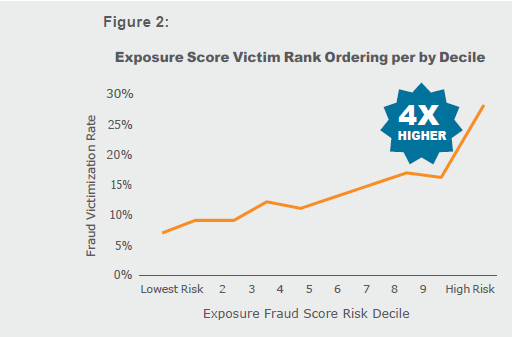Using social networks and sharing personal information online can dramatically increase your risk for fraud, a new study has found.
It makes sense that consumers who disclose the most about themselves online are at greater risk of becoming fraud victims. But the study claims their increased risk is probably more dramatic than you’d think, and it identifies three online habits that directly lead to higher odds consumers will suffer fraud.
ID Analytics, a fraud-fighting firm, has produced numerous studies through the years examining millions of fraud reports and credit applications in data it collects from lenders. It had never studied the direct relationship between sharing information online and the odds that someone would become a fraud victim, however. Until now.
The firm examined 100,000 records involving a mix of known victims and non-victims, and then used a people search engine to log each person’s online footprint and create what the firm called an “Exposure-Fraud Score.” The results were clear. Those who shared the most about themselves — who were among the top 10 or 20% of sharers — were four times more likely to be fraud victims than those who shared the least.
“Sharing” was defined as using multiple social networks, posting personal information on websites, or landing in other online databases, for example.
“To my knowledge, this is the first time anyone has quantified this,” said Dr. Stephen Coggeshall, chief analytics and science officer at ID Analytics.
The study also unearthed three clear predictors of becoming a fraud victim. They are, in order:
1. Number of social sites used
2. Number of websites of any kind where personal information was viewable to the public
3. Number of past addresses that can be found
The usual “correlation, not causation” caution applies to this test. It’s not clear why having numerous addresses associated with your identity might make you a more likely victim of fraud, though it’s easy to speculate. The more old addresses, the easier it is for a criminal to use one unnoticed, for example.
It’s also not clear what you can do if online data brokers sell information about your past that’s available from public records.
It is possible, however, to limit the number of social networks and websites where you post information about yourself. “The consumer message is: Be thoughtful about what you post,” Coggeshall said.
While that’s good advice — and most consumers already know it— many ignore it during their everyday Internet usage. Their actions don’t follow their intentions. (Check out these tips for better internet safety.)
“It’s called the ‘Privacy Paradox.’ There’s a lot of irrational behavior around what people say and what people do,” Coggeshall said. “There is a real conflict around behavior. People download a game or an app and just click all the buttons and say yes to everything.”
Few consider what they are giving away when they download software or start using a website. The median time spent on end-user license agreements is six seconds, Coggeshall said, citing a 2011 study published by MeasuringRU.com.
At a bare minimum, Coggeshall suggested, consumers should be wary of sharing seemingly harmless data points about themselves online. He was particularly concerned about consumers revealing their birth date, which is one essential piece of information often needed by criminals when committing identity fraud.
He wasn’t optimistic, however.
“This study suggests that consumers who continue to forfeit their privacy in favor of convenience will be at a higher risk for identity theft than the general population,” the report concludes.
This article originally appeared on Bob Sullivan's blog at:
https://bobsullivan.net/cybercrime/privacy/yes-using-more-social-networks-raises-your-risk-of-id-theft-a-lot-says-id-analytics/





